Search Posts
Recent Posts
- Rhode Island Weather for May 31, 2025 – Jack Donnelly May 31, 2025
- Burn with Kearns: Fix Your Foundation: Core, Mobility & Joint Health – Kevin Kearns May 31, 2025
- In the News… quick recap of the week’s news (5.31.25) May 31, 2025
- Business Beat: Navigant CU receives prestigious Community Impact Award from NEACH May 31, 2025
- To Do in RI: Taste of Rhode Island. Food, libations, entertainment, auction for Matunuck Oyster Bar May 31, 2025
Categories
Subscribe!
Thanks for subscribing! Please check your email for further instructions.

Rhode Island KIDS COUNT report on race, ethnic disparities in maternal, infant, child health
Racial and Ethnic Disparities in Maternal, Infant, and Young Children’s Health in Rhode Island
Currently, there is a maternal health crisis both nationally and in Rhode Island. Beyond that, there are unacceptable and persistent disparities in maternal, infant, and child health outcomes by race and ethnicity.
Rhode Island KIDS COUNT will release its newest publication, Racial and Ethnic Disparities in Maternal, Infant, and Young Children’s Health in Rhode Island, TODAY, Monday, January 30th at 3p.m. via ZOOM. Register to attend the ZOOM event here: https://us02web.zoom.us/webinar/register/WN_eIk2B_boQtKzN3bLopKHqA
Speakers will be Paige Clausius-Parks, Executive Director of Rhode Island KIDS COUNT; Michele Lederberg, Executive Vice President of Blue Cross & Blue Shield of Rhode Island; and Ana Novais, Acting Secretary of the Rhode Island Executive Office of Health and Human Services. Kaitlyn Rabb, MPH will share findings from the Issue Brief.
Reflections will be shared from the following panel: Ditra Edwards, Director of SISTA Fire; Susie Finnerty, Co-Founder of the Rhode Island Birth Worker Cooperative and Co-President of Doulas of Rhode Island; Dr. Beata Nelken, pediatrician; Quatia Osorio, Founder of Our Journ3i, Agency Director of RI Perinatal Doula Agency, & Executive Director of the Urban Perinatal Education Center; Founding Director of RI Birth Worker Cooperative; and Urban Farmer at Quaintly and Journey Farm; and a parent and SISTA Fire member.
Increased Diversity Among Rhode Island Children and Births
· In Rhode Island between 2010 and 2020, the Hispanic child population grew by 22% while the non-Hispanic white child population declined by 22%. In 2020, 47% of children in Rhode Island were Children of Color, up from 36% in 2010.
· Nationally, fertility rates have declined across all racial and ethnic groups; however, Black and Hispanic women have higher fertility rates than Asian and white women.
· In 2020 in Rhode Island, 46% of babies born were Babies of Color.
(Disparities in) Social Determinants of Health
· Health care only accounts for 10-20% of an individual’s overall health outcomes and is just one of the social determinants of health, which is defined as the conditions and environments where people are born, live, learn, work, and play and that greatly impact health outcomes.
· These social determinants of health, including economic stability, education access, neighborhood and the built environment, and social context account for over 80% of health outcomes.
· Disparities in social determinants of health can be traced back to the founding of the United States — the wealth-building policies that overwhelmingly benefited white citizens — and continue to impact the longstanding racial and ethnic disparities in health, including maternal and infant health.
· Racism became an economic tool infused into laws, policies, and practices that have harmed Asian, Black, Latinx, Native American and low-income white people for centuries. The effects are felt and reflected in the data to this day.
Racial and Ethnic Disparities in Maternal, Infant, and Young Children’s Health: Indicators and Outcomes
· Snapshots of several indicators that demonstrate the persistent racial and ethnic disparities in maternal, infant, and young children’s health. Please see the publication for a full explanation of the data
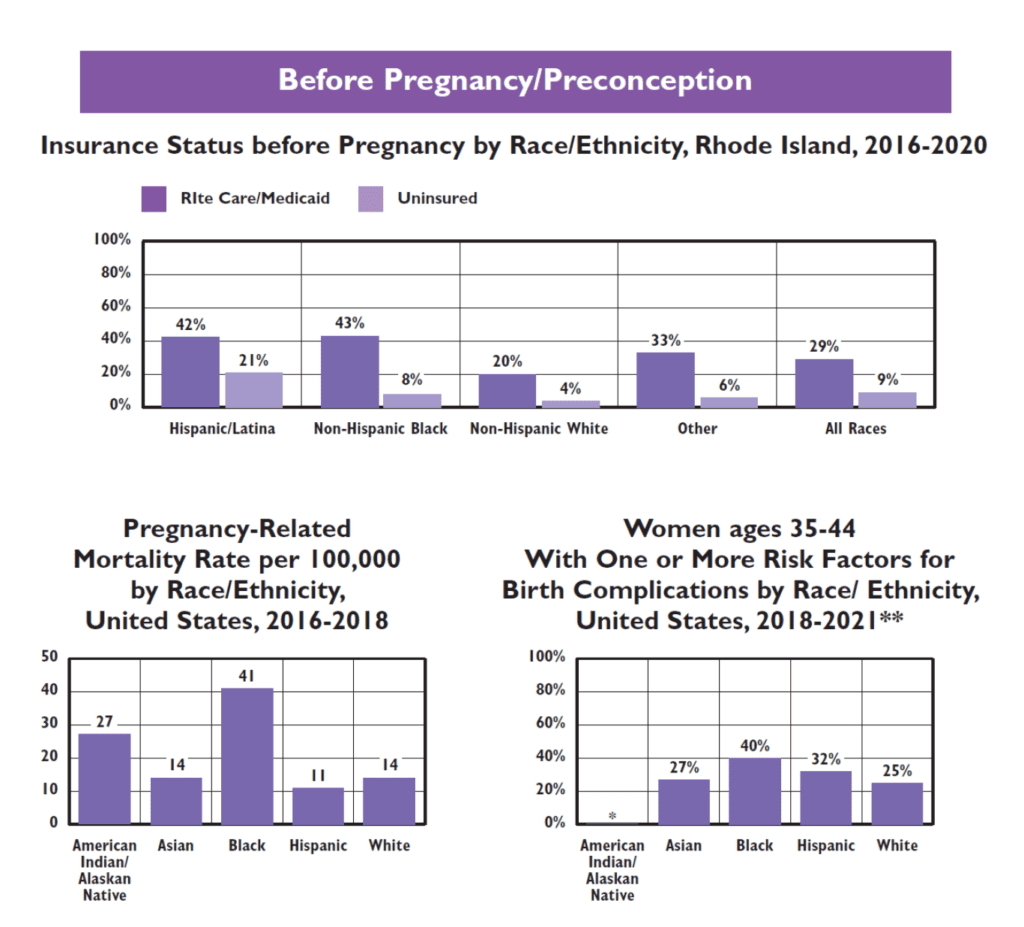
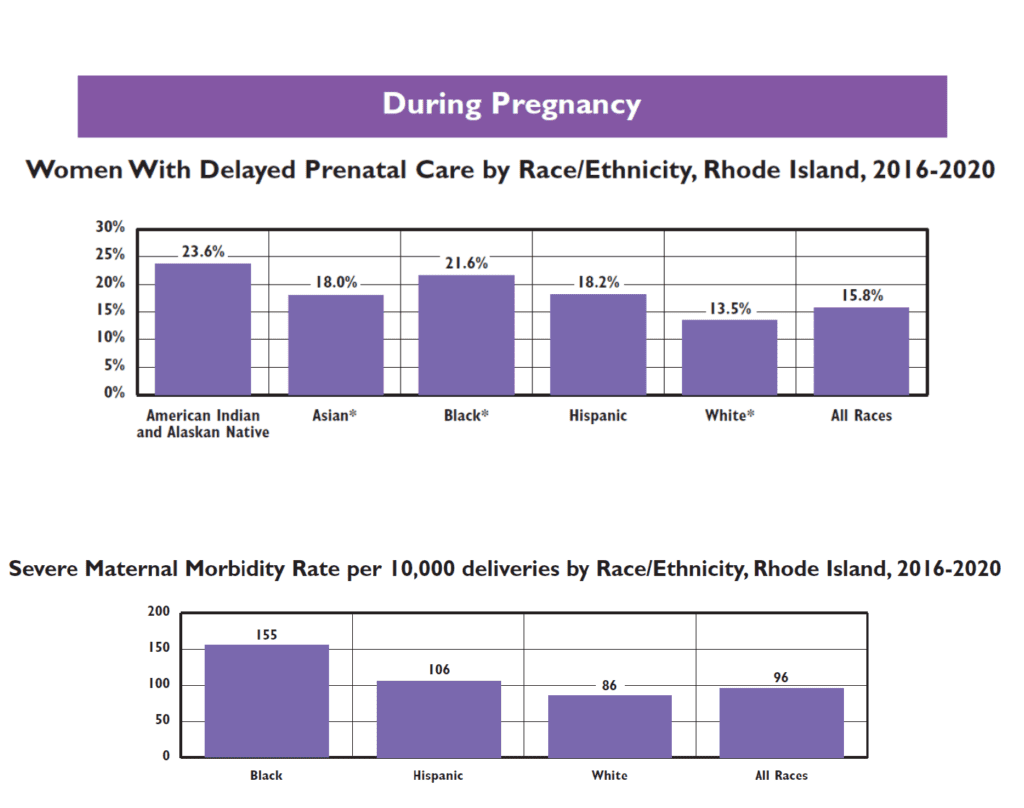
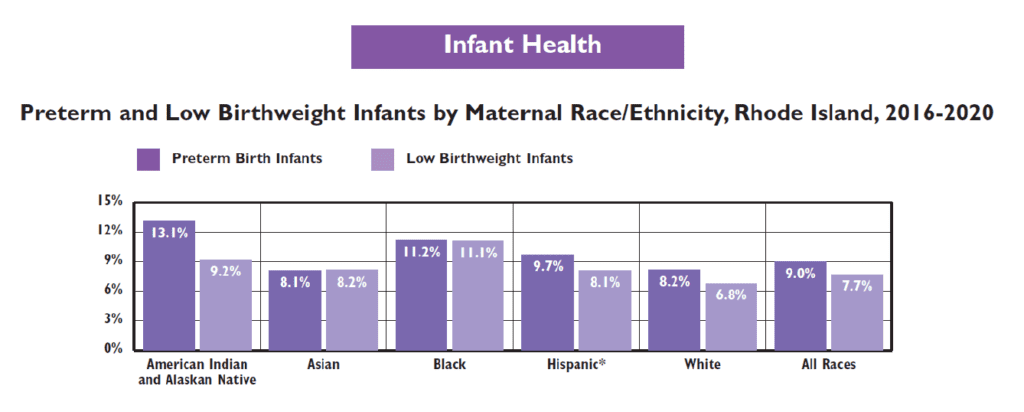
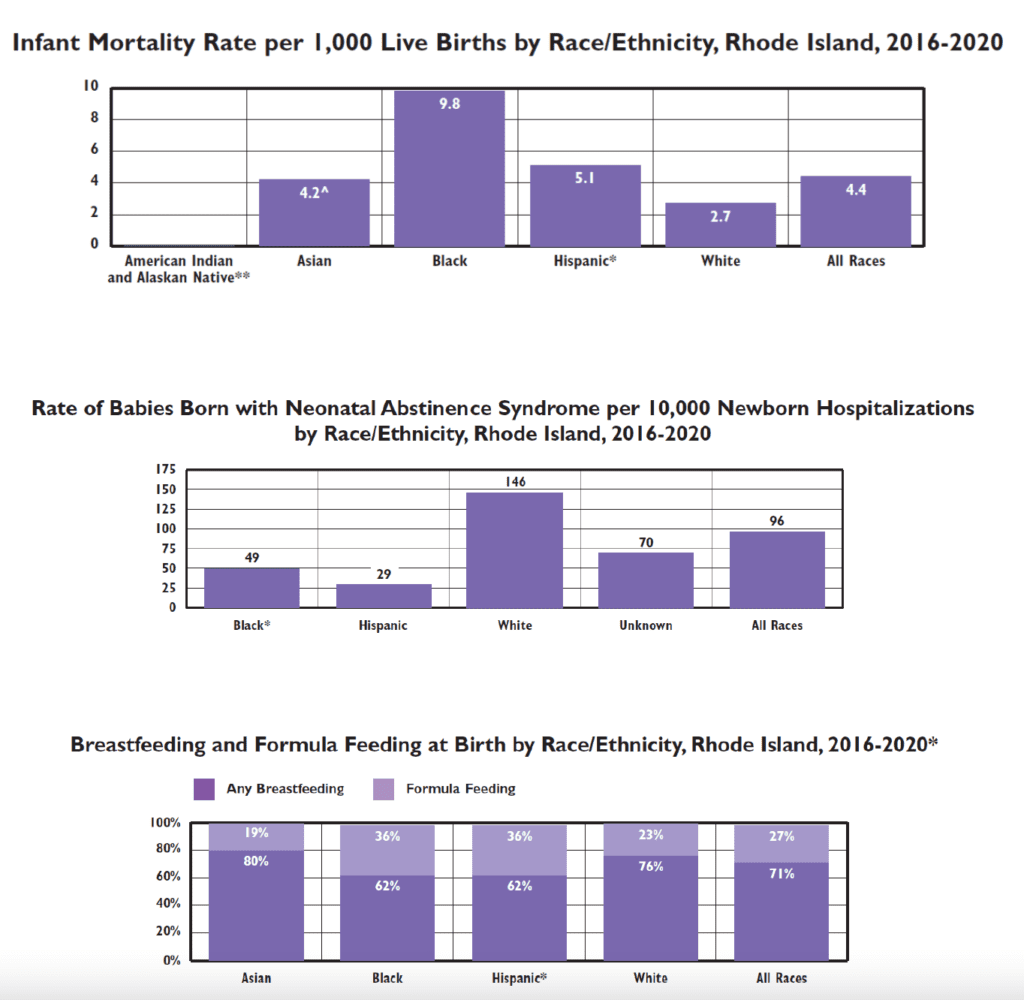

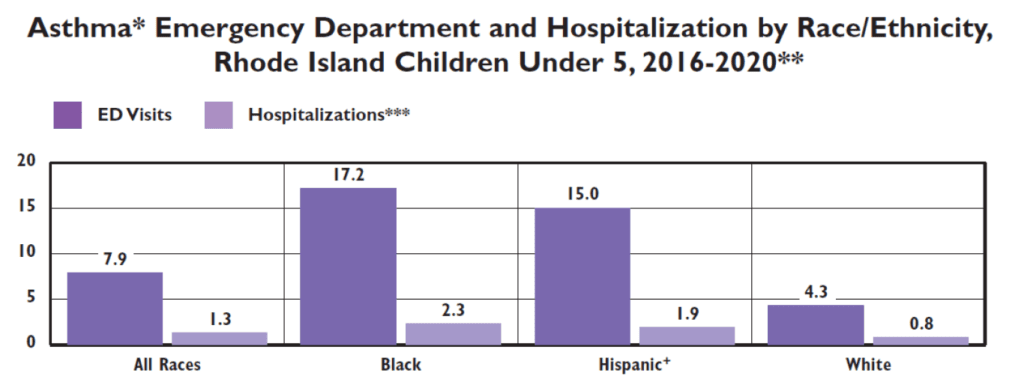
The Need for a Diverse and Culturally Competent Workforce
While local, state, and national infrastructure and policies can help support maternal health, a racially and ethnically inclusive workforce is needed to provide compassionate, respectful care to women and birthing people throughout their pregnancy. This workforce should include a diverse array of providers including primary care physicians, nurses, midwives, doulas and support personnel in and out of the hospital setting. It is important to focus on workforce development, recruitment, and retention to address racially diverse representation the workforce to improve disparities in maternal and infant health care.
Legislative Efforts to Expand Health Coverage to Address Racial and Ethnic Disparities in Rhode Island
- 12-Month Medicaid Postpartum Extension: The FY 2023 budget extended postpartum Medicaid coverage from 60 days postpartum to 12 months postpartum and allows for state funds to be used to provide coverage regardless of immigration status.
· Cover All Kids: The Cover All Kids Act, which passed which passed as part of the FY 2023 budget, has restored Rhode Island’s policy of allowing all eligible low-income children, regardless of immigration status, to enroll in RIte Care and will help insure more kids.
- Continuous Medicaid Coverage from Birth to 5: Once enrolled in RIte Care, it is critical that children stay continuously covered. Even a short gap in coverage can result in children missing needed care such as treatment for a chronic condition. Starting in January 2024, states are required to allow children to remain enrolled for a full year (12 months).
- Infant and Early Childhood Mental Wellness Act: In 2022, the General Assembly passed the Infant and Early Childhood Mental Wellness Act that requires the state to create a plan to use Medicaid to help improve early identification and treatment of mental health challenges in young children (Birth through age 5).
“The health of Black and Brown mothers and babies are at risk in Rhode Island,” said Paige Clausius-Parks, Executive Director of Rhode Island KIDS COUNT. “The story that this data tells is heavy and painful and should mobilize each and every person to call on our policymakers to act now.”
Kaitlyn Rabb, Policy Analyst at Rhode Island KIDS COUNT said, “The voices of those with lived experiences tells more than numbers and data can show — that this crisis is directly impacting many women and families of color in Rhode Island.”
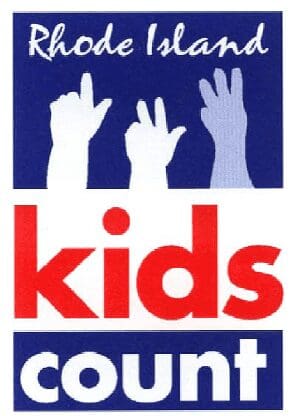
Recommendations
Data Collection
- Support community-led data collection efforts that produce community-led solutions that reflect the lived experiences of Rhode Island’s Asian, Black, Latino, and Native American communities.
- Increase data collection and reporting of data disaggregated by race and ethnicity, including data on the Native American and diverse Asian and Pacific Islander populations.
- Ensure that Rhode Island’s Pregnancy and Postpartum Death Review Committee collects and reports timely and comprehensive data on maternal mortality to inform prevention efforts.
Equity
- Monitor implementation of recent legislation and processes that impact health coverage, including Cover All Kids, 12-month postpartum extension, and Medicaid redetermination efforts.
- Provide equitable access to comprehensive reproductive health care and address factors that contribute to poor health outcomes, including passage of the Equality in Abortion Coverage Act.
- Pass legislation that requires the General Assembly to include equity impact statements in any legislation related to health.
- Implement policies that support recruitment, development, and retention of a racially, culturally, and linguistically representative and competent workforce, including scholarships for BIPOC students, adequate compensation, and training for current health care workforce.
- Improve the RI Works program by allowing a first time pregnant person to receive cash assistance from verification of pregnancy.
Maternal Health
- Engage collaborators including community-engaged leadership to enhance the implementation of innovative strategies like SISTA Fire’s Birth Justice Demands.
- Ensure access to health care for the treatment of chronic diseases, reproductive health, mental health, and preconception care within a comprehensive coordinated medical system.
- Ensure access to culturally and linguistically competent and respectful health care providers through quality improvement practices, standards of care, and accountability policies.
- Reduce barriers to doula care and other community-based supports by facilitating insurance reimbursement, ensuring that hospital policies recognize the value of these supports, and implementing policies that help doulas work within their systems.
- Support and invest in maternal mental health programs such as MomsPRN.
Infant Health
- Improve Rhode Island’s paid family leave program by increasing the wage replacement and expanding the number of weeks offered to families to meet or exceed the policies of our neighboring states.
- Ensure workforce protections and implement breastfeeding accessibility for breastfeeding people, including supporting lactation consultants.
- Review screening practices and protocols to ensure equitable, compassionate, timely, and quality care for infants and caregivers exposed to substances.
Young Children
- Implement continuous Medicaid coverage from birth through age 5 to ensure that children have consistent coverage during a critical developmental period.
- Create and enact equitable lead remediation plans for homes and water supply lines, including full lead service line replacement.
- Address air pollution and environmental conditions in communities where Children of Color live.
- Ensure that recent rate increases are adequate to recruit and retain qualified staff in Early Intervention programs so families do not have to wait for critical services.
Rhode Island KIDS COUNT is a statewide children’s policy organization that works to improve the health, economic well-being, safety, education, and development of Rhode Island children with a core focus on equity.
